Related Research Articles
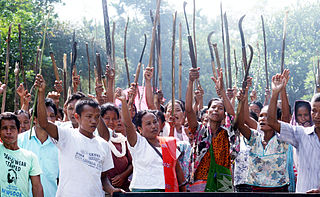
Bandh is a form of protest used by political activists in South Asian countries such as India and Nepal. It is similar to a general strike. During a bandh, a political party or a community declare a general strike. For example, a Bharat bandh is a call for a bandh across India, and a bandh can also be called for an individual state or municipality.

The Maharashtra Navnirman Sena is a nationalist far-right Indian political party based in the state of Maharashtra and operates on the motto of "Sons of the Soil". It was founded on 9 March 2006 in Mumbai by Raj Thackeray after he left the Shiv Sena party due to differences with his cousin Uddhav Thackeray, who is the 19th Chief Minister Of Maharashtra and to his sidelining by the Shiv Sena in major decisions like distribution of election tickets.
The Kherlanji massacre refers to the 2006 murders of Scheduled Caste citizens by villagers of Khairlanji. The killings took place in a small village in India named Kherlanji, located in the Bhandara district of the state of Maharashtra.
Caste-related violence in India has occurred and continues to occur in various forms.

The 2008 attacks on Uttar Pradeshi and Bihari migrants in Maharashtra began on 3 February 2008 after violent clashes between workers of two political parties—Maharashtra Navnirman Sena (MNS) and Samajwadi Party (SP)—at Dadar in Mumbai, capital of the Indian state of Maharashtra. The clashes took place when workers of MNS, a splinter faction formed out of the Shiv Sena, tried to attack workers of SP, the regional party based in Uttar Pradesh, who were proceeding to attend a rally organised by the United National Progressive Alliance (UNPA). Defending his party's stand, MNS chief Raj Thackeray explained that the attack was a reaction to the "provocative and unnecessary show of strength" and "uncontrolled political and cultural dadagiri (bullying) of Uttar Pradesh and Bihar migrants and their leaders".
Anti-Bihari sentiment refers to discrimination against the migrant people of the Indian state of Bihar which is a state in the north-eastern Gangetic plains of the country. Bihar had slower economic growth than the rest of India in the 1990s which led to Biharis migrating to other parts of India in search of opportunities. Bihari migrant workers have been subject to a growing degree of hatred by the locals of those states because of their stereotyping as criminals. Moreover, the Biharis have been victimized due to the growing anti-Hindi imposition sentiment in non-Hindi states owing to the Central government agencies excluding regional languages in many national exams and services.
On 19 October 2008, Maharashtra Navnirman Sena (MNS) and Shiv Sena activists attacked North Indian candidates appearing for the All India Railway Recruitment Board entrance exam for the Western region in Mumbai, India. The attacks invoked a quick reaction from Bihar members of the Union Government in Delhi, notably the Union Railways Minister Lalu Prasad Yadav and his cabinet colleague, Ram Vilas Paswan. The Chief Minister of Bihar, Nitish Kumar spoke to his Maharashtra counterpart Vilasrao Deshmukh and urged him to provide protection to the migrants from Bihar. Lalu demanded a ban on the MNS, and described its chief Raj Thackeray as a "mental case".
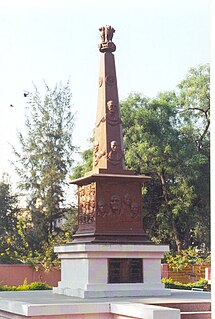
Latur is a city in Maharashtra state, India, and is one of the largest cities of the Marathwada region. It is the administrative headquarters of Latur district and Latur Taluka. The city is a tourist hub surrounded by many historical monuments, including Udgir Fort and Kharosa Caves. The people in Latur are called Laturkar. The most spoken language in Latur is Marathi. The city's quality of education attracts students from all over Maharashtra.
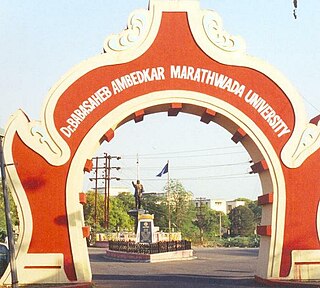
Namantar Andolan was a Dalit and Navayana Buddhist movement to change the name of Marathwada University, in Aurangabad, Maharashtra, India, to Dr. Babasaheb Ambedkar University. It achieved a measure of success in 1994, when the compromise name of Dr. Babasaheb Ambedkar Marathwada University was accepted. The movement was notable for the violence against Dalits and Navayana Buddhists.
Sudhir Dhawale is an Indian activist, actor and publisher of the bi-monthly Marathi magazine Vidrohi. He is also the founder of organisation, Republican Panthers.
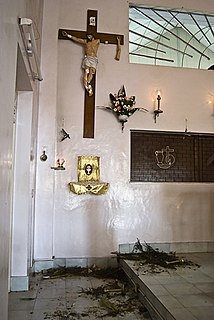
Adoration Monastery of the Sisters of St-Clare is a Christian monastery in Hampankatta, Mangalore, Karnataka, India, near Milagres Church. On 14 September 2008 the 2008 attacks on Christians in southern Karnataka broke out here, quickly followed by some 13 others within one hour. The attacks began when a group of some 15 youths on motorbikes from the suspected Hindu nationalist organization Bajrang Dal arrived at the chapel at around 10.15 am, IST, shouting a pro-Bajrang Dal slogan. They entered the monastery and attacked it with lathis, desecrating the tabernacle and the Eucharist, the monstrance, a crucifix, the oil lamps, the vases on the altar and a few statues of saints. A couple praying in the church at the time were also reportedly beaten by the intruders. Two nuns were also reportedly injured.
The 1997 Ramabai killings were a mass killing of Dalit residents of the Ramabai Ambedkar Nagar colony in Mumbai on 11 July 1997. A team of State Reserve Police Force members fired upon a crowd protesting the recent desecration of a statue of Dalit micon B. R. Ambedkar. 10 Dalits were killed and 26 injured in the incident.
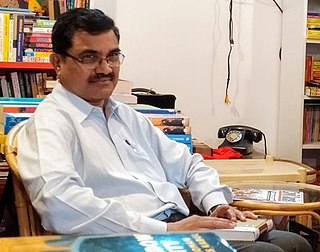
Anand Teltumbde is an Indian scholar, writer, and civil rights activist who is a management professor at the Goa Institute of Management. He has written extensively about the caste system in India and has advocated for the rights of Dalits.
Azad Maidan Riot refers to a protest by Indian muslims, organised in Azad Maidan on 11 August 2012 to condemn the Rakhine riots and which later turned into a riot. The riot reportedly began as the crowd got angry either after hearing an inflammatory speech or after seeing photographs of Rakhine state riots. The riot resulted in two deaths and injuries to 63 people including 58 police officers. Mumbai Police estimated that the riots caused a loss of ₹2.74 crore in damages to public and private property.
The Worli riots refers to the violence that occurred in the chawl, or tenement, in the Worli neighborhood of Mumbai between January and April 1974. The riots began on 5 January 1974 after the police attempted to disperse a rally of the Dalit Panthers that had turned violent. Regular clashes between the Dalit Panthers, the Shiv Sena, and the police continued for several months. Six people were killed in the riots, and approximately 113 injured; widespread property damage also occurred in the tenements. The riots have been described as anti-Dalit violence by scholars.

Jai Bhim Comrade is a 2011 Indian documentary film directed by Anand Patwardhan. The film begins with a description of police violence in the 1997 Ramabai killings. It goes on to explore various aspects of the lives and politics of Dalit people in Mumbai. The film took 14 years to produce, and was released in 2011 after the conclusion of the court trials that followed the Ramabai incident. The film was widely shown both nationally and internationally, and received an overwhelmingly positive reaction. It has won numerous national and international awards.
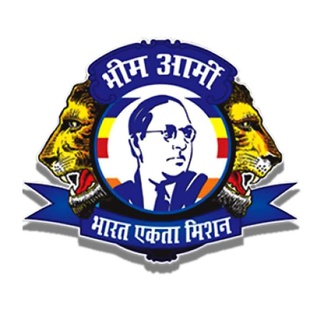
The Bhim Army, alternatively Bheem Army or the Bheem Army Bharat Ekta Mission is an Ambedkarite and dalit rights organisation in India. It was founded by Satish Kumar, Vijay Ratan Singh and Chandrashekhar Azad in 2015. The organisation runs more than 350 free schools for Dalits and Bahujans in the districts of Saharanpur, Meerut, Shamli and Muzaffarnagar in western Uttar Pradesh. The organisation is named after Bhimrao Ramji Ambedkar.
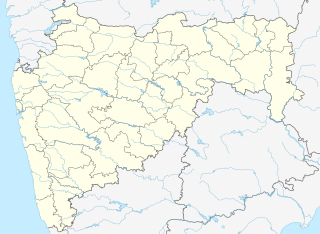
The 2018 Bhima Koregaon violence refers to violence during an annual celebratory gathering on 1 January 2018 at Bhima Koregaon to mark the 200th anniversary of the Battle of Bhima Koregaon. The violence and stone pelting by anti-social elements on the gathering resulted in death of a 28-year old youth and injury to five others. The annual celebration, also called Elgar Parishad convention, was organised by retired justices B. G. Kolse Patil and P. B. Sawant. Justice P. B. Sawant claimed that the term "Elgar" meant loud invitation or loud declaration.

Rajgruha is a memorial and house of the leader B. R. Ambedkar at Hindu colony of Dadar in Mumbai, India. It was named Rajgriha in reference to the ancient Buddhist kingdom. The ground floor of the three-story building hosts a heritage museum, as a memorial to the Indian leader.

Chandrakant Damodhar Handore is an Indian politician from Maharashtra. He is an Indian National Congress member and had represented Chembur in 12th Maharashtra Legislative Assembly in Vilasrao Deshmukh ministry. On 5 February 2021, Handore appointed as a Working President of the Maharashtra Pradesh Congress Committee. He is former cabinet minister for Social Justice of the Government of Maharashtra. He was elected Mayor of Mumbai for the period 1992 to 1993. Handore was a vice President of the Maharashtra Pradesh Congress Committee for the period 2014 to 2021. Since 2020, he is also the Incharge of Mumbai Pradesh Congress Committee. Handore is the founder and president of the "Bhim Shakti", an Ambedkarite and socio-political organization.
References
- ↑ "Dalit blood on village square". Frontline. Retrieved 2006-12-02.
- 1 2 "Khairlanji to Kanpur". The Indian Express. 2006-12-02. Archived from the original on 14 December 2006. Retrieved 2006-12-02.
- ↑ "Irrational violence: A result of dalit marginalisation". The Economic Times. 2006-12-02. Retrieved 2006-12-02.
- 1 2 3 4 5 6 "Situation in Mumbai, state back to normal". The Times of India . 2006-12-02. Archived from the original on 2012-04-18. Retrieved 2006-12-02.
- 1 2 3 4 5 6 7 8 9 10 11 "Maharashtra: Dalit anger leaves 4 dead, 60 injured". Rediff.com. 2006-11-30. Archived from the original on 6 December 2006. Retrieved 2006-12-02.
- ↑ Sharma, Kalpana (2006-12-02). "Why are Maharashtra's Dalits so angry?". The Hindu . Archived from the original on 20 April 2011. Retrieved 10 June 2013.
- ↑ "Anti-RR Patil forces behind riots: Raj". Economic times. 2006-12-02. Archived from the original on 5 December 2006. Retrieved 2006-12-03.
- 1 2 3 4 5 "3 killed in Maharashtra Dalit violence". IBN Live. 2006-11-30. Archived from the original on September 27, 2007. Retrieved 2006-12-01.
- 1 2 Khan, Atiq (2006-12-02). "Youth arrested for statue desecration". The Hindu . Archived from the original on 2007-10-01. Retrieved 2016-03-06.
- 1 2 "Dalits force police to let off suspect in Kanpur". Business Standard. 2006-12-01. Retrieved 2006-12-02.
- 1 2 "Dalit youth held for desecrating Ambedkar statue". Deccan Herald. 2006-09-26. Archived from the original on 2016-02-19. Retrieved 2006-12-02.
- ↑ "Caste protests grip Indian state". BBC. 2006-11-30. Archived from the original on 30 November 2006. Retrieved 2006-12-02.
- ↑ "Dalit protests: Deshmukh calls all-party meet". NDTV. 2006-12-02. Retrieved 2006-12-02.
- 1 2 "Statue desecration: Dalit activists demand action". The Hindu . 2006-12-01. Retrieved 2006-12-02.[ dead link ]
- ↑ "Athwale alleges "house arrest" in Kanpur". Zee News. 2006-12-02. Retrieved 2006-12-02.